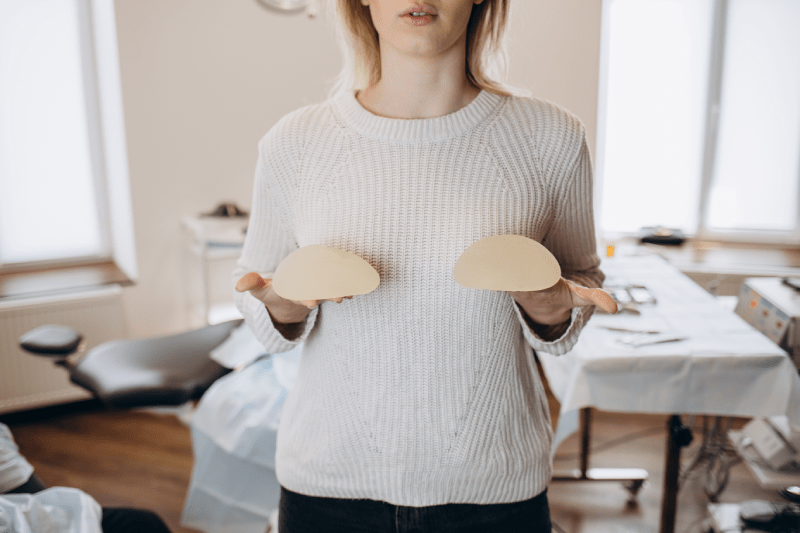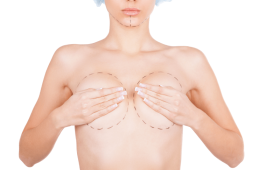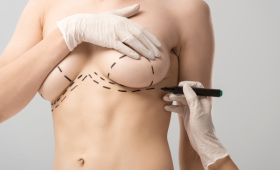Is It Generally Possible To Breastfeed After Breast Augmentation Surgery?
Yes, it is absolutely possible. Modern breast augmentation techniques are performed with maximum respect for the milk glands and ducts. The experience of the surgeon and the technique used are the most important factors in preserving the ability to breastfeed. Most women can successfully breastfeed their babies without any problems after breast augmentation surgery. Cure Holiday works with the most experienced surgeons in this sensitive area, ensuring you can achieve your aesthetic goals without risking your motherhood plans.
Does The Placement Of The Implant Affect Breastfeeding?
Yes, the location of the implant is one of the most important factors affecting breastfeeding potential. Placing implants under the muscle (submuscular) creates a barrier of muscle tissue between the milk glands and ducts and the implant. This method is the best option for preserving breastfeeding ability as it involves minimal interference with the breast tissue. Placement over the muscle (subglandular) carries a theoretically higher risk as it is closer to the milk glands. Cure Holiday consultants listen to your expectations and future plans to present you with the safest placement plan.
Which Surgical Incision Site Is The Safest For Breastfeeding?
The choice of incision site can also directly affect the ability to breastfeed. Incisions made in the crease under the breast (inframammary) or through the armpit (transaxillary) are considered the safest methods for breastfeeding as they are completely away from the nipple and milk ducts. An incision around the nipple (periareolar) may slightly increase the risk of damage as it is closer to the milk ducts and nerves. In the planning you do with Cure Holiday, preserving breastfeeding function is prioritized as much as the aesthetic result.
Does It Matter For Breastfeeding Whether The Implant Is Silicone Or Saline?
No, the content of the implant (silicone or saline) does not make a difference in terms of breastfeeding ability or the safety of the milk. The outer surface of both types of implants consists of a durable silicone shell that prevents the contents from leaking. Today’s modern implants are extremely safe. Scientific studies have shown that the silicone levels in the milk of mothers with silicone implants are no different from the levels in the milk of mothers without implants. Cure Holiday prefers clinics that use only FDA-approved implants of the highest quality and safety standards.
Does The Surgery Reduce My Milk Production Amount?
When performed with the correct technique, breast augmentation surgery is not expected to significantly reduce milk production. However, especially with incisions made through the nipple, some nerves may be affected, which can weaken the brain’s signal to release the milk-producing hormone prolactin. This can cause a slight decrease in milk production. Protective techniques such as under-the-muscle placement and under-the-breast incisions minimize this risk. Cure Holiday works with specialists who adopt the most sensitive surgical approaches to protect your breastfeeding potential.
Does The Presence Of An Implant Pose A Risk To My Baby’s Health?
No, scientific evidence shows that breast implants do not pose a risk to babies fed with breast milk. The contents of modern implants do not leak into the body or milk thanks to a durable outer layer. Reputable health organizations like the American Academy of Pediatrics state that it is safe for mothers with silicone implants to breastfeed their babies. Cure Holiday always puts your health and the health of your future baby first and ensures that the most reliable materials are used in this regard.
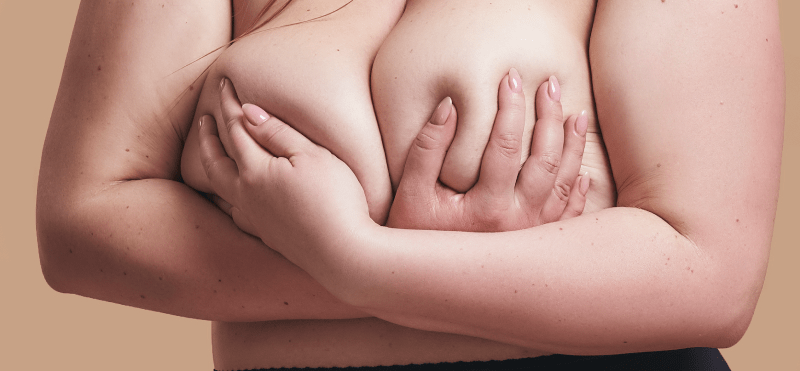
Will I Feel A Different Sensation In My Breasts During Breastfeeding?
It is normal to experience changes in sensation in the breast tissue, especially in the nipple, after breast augmentation surgery. This may slightly change how you feel your baby’s latch or the milk let-down reflex during breastfeeding. However, this is generally not a barrier to breastfeeding. Most women adapt to the new sensation over time. You can get detailed information about these potential changes from your Cure Holiday consultant before the surgery.
Will The Implant Prevent My Baby From Latching On Properly?
Generally, no. The presence of the implant does not prevent the baby from properly latching on by taking the nipple and the surrounding areola into their mouth. However, in situations where the implant makes the breast tissue tighter or changes the position of the nipple, it might be slightly more difficult for the baby to find the right position initially. In such cases, getting support from a lactation consultant can make the process easier.
How Does Having An Implant With A Breast Lift Surgery Affect Breastfeeding?
A breast lift (mastopexy) surgery is a more complex procedure than breast augmentation because it involves reshaping the breast tissue and removing excess skin. During this procedure, the risk of affecting the milk ducts and their connections to the nipple is higher. When a lift is performed along with augmentation, there is a possibility that the ability to breastfeed may be somewhat reduced. Cure Holiday ensures that you discuss your breastfeeding expectations in detail with the surgeon for such combined surgeries and that the most protective technique is chosen.
How Soon After The Surgery Is It Safe To Get Pregnant?
Surgeons generally recommend waiting at least 6 months to 1 year after breast augmentation surgery for the body to fully heal and the implants to settle. This period is important both for the surgical results to be permanent and for the body to be ready for the hormonal and physical changes of pregnancy. If you are not in a hurry, waiting for this period is the healthiest approach. Cure Holiday will guide you on the most appropriate timing according to your personal situation.
Will Pregnancy And Breastfeeding Deform The Shape Of My Implanted Breasts?
Pregnancy and breastfeeding cause changes in the breasts of all women, with or without implants. Sagging and loss of volume can occur in the breast tissue as it fills with milk and then empties. The implant does not prevent these changes but can provide some support to the breast tissue, reducing the degree of sagging. It is difficult to predict the final appearance of your breasts after breastfeeding. A revision or lift surgery can be considered in the future if deemed necessary.
What Are My Alternatives To Feed My Baby If I Cannot Breastfeed?
It is important not to be discouraged if your ability to breastfeed is somewhat reduced or if you cannot breastfeed at all after breast aesthetics. The bond with your baby is not built solely through breastfeeding. Formula milks are developed to meet all of your baby’s nutritional needs. Additionally, options such as obtaining breast milk from a milk bank or mixed feeding (both breast milk and formula) are available. What is important is that your baby is fed healthily in a loving environment.
What Should I Ask My Surgeon To Protect My Ability To Breastfeed?
The consultation you have with your surgeon before the surgery is very important. You should ask clear questions such as, “Breastfeeding is a priority for me, what techniques will you use to protect this goal?”, “Which incision site and implant placement do you recommend and why?”, and “What is the percentage probability of preserving my ability to breastfeed with these techniques?”. Cure Holiday asks these critical questions on your behalf from the very beginning, ensuring you work with surgeons who value functional results as well as aesthetic ones.
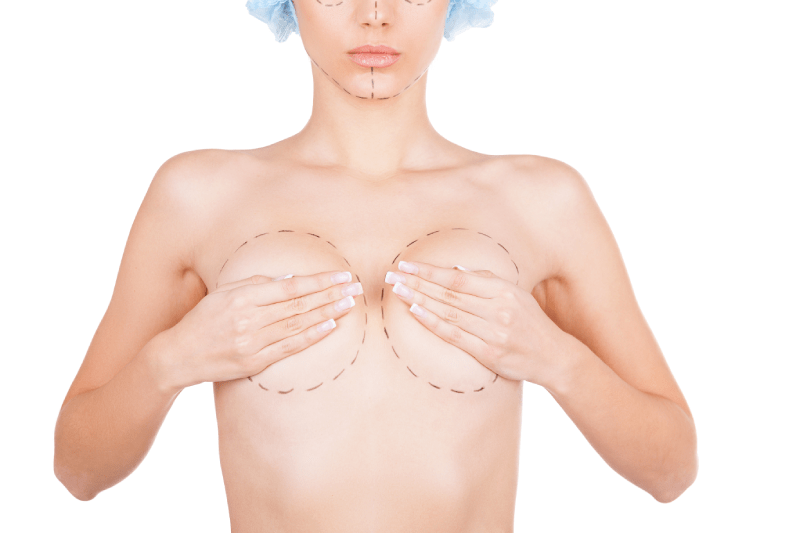
Does The Implant Size Affect The Likelihood Of Breastfeeding?
The size of the implant can indirectly affect breastfeeding. An implant chosen to be very large for your body structure can put excessive pressure on the breast tissue and milk glands, negatively affecting blood circulation and function. This can slightly reduce milk production. Therefore, it is important to choose a proportionate implant size that will both look aesthetically natural and protect the health of the breast tissue. The expert consultants at Cure Holiday will help you choose the right implant size.
Does The Risk Of Blocked Milk Ducts Increase After Surgery?
The scar tissue that forms in the breast tissue during healing after surgery can theoretically compress or block some milk ducts. This can slightly increase the risk of mastitis (breast inflammation) or ductal blockage during the lactation period. However, this risk is quite low with the correct surgical technique. Regularly massaging your breasts and breastfeeding your baby frequently during lactation helps to keep the ducts open.
How Will I Know If My Milk Is Coming In?
The milk production process after breast aesthetics is the same as for women who have not had surgery. In the first few days after birth, you will start to feel fullness, tenderness, and tingling in your breasts. This is a sign that your milk is coming in. When your baby starts to suckle, you may also experience a tingling or pressure sensation known as the “let-down reflex.” If you have concerns about these signs, you should talk to a lactation consultant or your doctor.
If I Get Mastitis While Having Implants, Will My Treatment Be Different?
No, having implants does not change the treatment for mastitis. Mastitis is a breast infection caused by a blocked milk duct, and its treatment usually involves antibiotics, warm compresses, rest, and continuing to empty the breast (by breastfeeding or pumping). The implant does not affect this treatment protocol. It is important to contact your doctor immediately if you notice symptoms of mastitis (redness, pain, fever).
I Tried Breastfeeding But Was Not Successful, Is The Surgery The Problem?
There can be many reasons for difficulties with breastfeeding, and it is not always related to the surgery. Factors such as the baby’s incorrect latch, hormonal problems, stress, or fatigue can also affect breastfeeding. Do not give up immediately if you experience difficulties after surgery. Getting professional support from a lactation consultant can help you find the source of the problem and come up with a solution. Cure Holiday also guides you on such matters during your treatment process.
Should I Consult A Lactation Consultant Before The Surgery?
If you definitely want to breastfeed in the future and this is your top priority, consulting a lactation consultant before deciding on surgery can be a great idea. The consultant can provide you with information about the physiology of breastfeeding and guide you on the right questions to ask your surgeon. This will help you start the process more consciously and prepared.
What Is The Lifespan Of The Implant And Does Breastfeeding Affect It?
Modern breast implants are not designed to last a lifetime but are quite durable. Manufacturers generally foresee a lifespan of 10-20 years. The breastfeeding process itself does not directly affect the structure or lifespan of the implant. However, the changes in breast tissue after pregnancy and breastfeeding can affect the aesthetic appearance, which may lead to a desire to replace the implants or have a lift surgery in the future.
What Will My Breasts Look Like After I Finish Breastfeeding?
This varies greatly from person to person. While some women’s breasts return to a look very close to their pre-pregnancy form after breastfeeding, others may experience more significant sagging and volume loss. The implant can help the breast remain fuller by compensating for some of the lost volume. However, factors such as your skin elasticity and how much weight you gained during pregnancy also affect the outcome. The final appearance usually emerges about 6 months after you stop breastfeeding.
What Can I Do To Increase My Milk Supply If It Is Low?
There are many things you can do to increase your milk supply, and these methods are the same whether you have implants or not. Breastfeeding your baby frequently and in the correct position is the most important rule. Drinking plenty of fluids, eating healthily, resting, and avoiding stress also support milk production. Additionally, some herbal supplements or medications known as galactagogues (under a doctor’s supervision) and using a breast pump can also be beneficial.
Is It Safe To Use A Breast Pump With Implants?
Yes, it is completely safe to use a breast pump when you have implants. The pump only applies a vacuum to the nipple and the surrounding tissue to extract milk; it has no effect on or harm to the deeper tissues where the implant is located. You can safely use a breast pump to support your milk production, relieve your breasts, or leave milk for your baby while you are at work.
Can I Breastfeed If I Lose Nipple Sensation After Surgery?
A slight decrease or temporary loss of nipple sensation is not a barrier to breastfeeding. Breastfeeding is a mechanical process that occurs when the baby correctly takes the nipple and areola into their mouth. Sensation can affect the mother’s pleasure from the process and the feeling of the let-down reflex, but it does not prevent breastfeeding itself. There is also a high probability that sensation will return over time as the nerves heal.
Is It Safe To Have This Surgery In Turkey In Terms Of Breastfeeding?
Yes, Turkey is home to some of the most experienced and talented surgeons in the world in this field. Turkish surgeons place great importance on preserving functions as well as achieving aesthetic success. When you have surgery in Turkey through Cure Holiday, you can be sure that you will be working with a team that understands your breastfeeding concerns and applies the most protective modern techniques. High-quality standards and experience make Turkey a safe option in this regard.
How Can Cure Holiday Help Me In This Process?
Cure Holiday is more than just an organizer of a surgery; it is a companion that understands all your concerns and priorities. We communicate your sensitivity about breastfeeding to the surgeon from the very beginning, and we choose the most protective technique and the most experienced team for you. We answer all your pre- and post-operative questions, give you confidence, and ensure that you do not compromise your motherhood plans while achieving the look of your dreams.
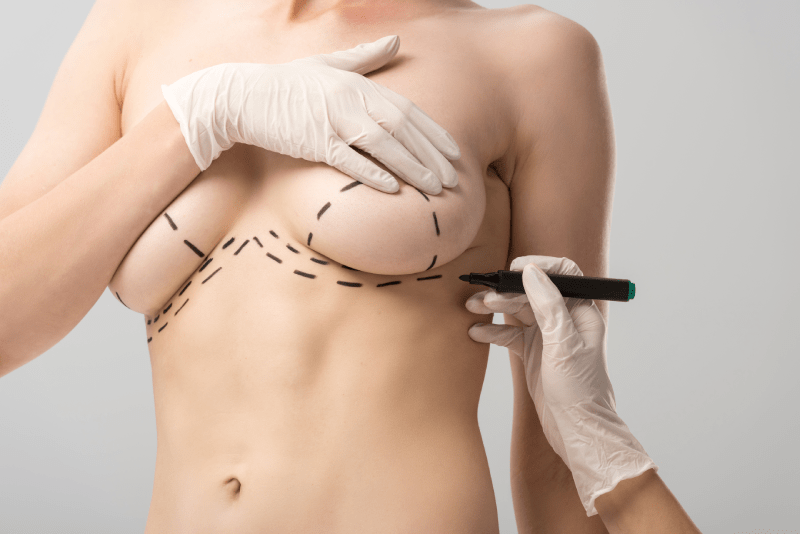
Is A Revision Surgery Necessary After Breastfeeding?
This is a completely personal decision. If you are happy with the new look of your breasts after breastfeeding, no additional procedure is necessary. However, if significant sagging or volume loss bothers you, a revision (implant replacement) or lift surgery can be considered. It is recommended to wait until the breastfeeding process is completely over and your body has stabilized before making such a decision.
Does Breast Reduction Surgery Affect Breastfeeding More?
Yes, breast reduction surgery affects the ability to breastfeed much more than breast augmentation surgery. This is because, in the reduction procedure, a significant portion of the milk glands and ducts are removed, and the position of the nipple is changed. Therefore, the probability of successfully breastfeeding after breast reduction surgery is lower. If you plan to have children and breastfeed in the near future, you might consider postponing the reduction surgery.
Will The Color Or Taste Of Milk From An Implanted Breast Be Different?
No, absolutely not. The breast implant is not in direct contact with the glands where milk is produced and does not affect the chemical structure, color, taste, or nutritional value of the milk in any way. There is no discernible difference for the baby between the milk of a mother with implants and a mother without implants. Your milk will continue to be the most perfect and natural source of nutrition for your baby.
I Am Thinking Of Having Surgery But I Am Scared, What Should I Do?
Fear and anxiety are very normal, especially before a surgery that could affect your future motherhood plans. The best way to overcome these fears is through information. Get information from reliable sources about the process, read real patient experiences, and do not hesitate to ask all the questions on your mind. The experienced consultants at Cure Holiday will patiently listen to all your concerns and help you get through this process comfortably by providing you with the most accurate, scientific, and reassuring information.
What Happens If There Is A Problem With My Implant During Lactation?
Problems with implants (such as rupture or leakage) are extremely rare, especially with modern implants. The probability of such a situation occurring during the lactation period is very low. However, if you have such a suspicion, you should immediately contact your surgeon or a doctor. Imaging methods such as ultrasound or MRI are usually used for diagnosis. If confirmed, you may need to stop breastfeeding and plan a surgery to replace the implant.
Is It More Logical To Have Surgery Before Or After Pregnancy?
This depends entirely on your personal priorities. If you have completed the process of having children and breastfeeding, having the surgery afterward can provide a more lasting aesthetic result by also correcting the changes caused by pregnancy. However, if you do not plan on having children for many years and are unhappy with your current appearance, having the surgery earlier to boost your self-confidence is also a logical option. Cure Holiday will help you chart the most suitable path in either scenario.
How Does Breastfeeding Work If I Only Have An Implant In One Breast?
If you have had a unilateral breast augmentation (for example, to correct asymmetry), you can try to breastfeed from both breasts. The milk production in your operated breast may be less than the other or none at all. Even in this case, your baby can get enough milk from your other breast. Successfully breastfeeding with just one breast is also a very common situation. Your body will adjust the milk production according to the baby’s needs.
How Can I Access The Most Up-to-date Scientific Information On This Topic?
To access the most current and reliable information on this topic, you can follow the websites and publications of reputable professional organizations such as the American Society of Plastic Surgeons (ASPS) and the International Society of Aesthetic Plastic Surgery (ISAPS). Additionally, the resources of international organizations specializing in breastfeeding, such as La Leche League, are also useful. Cure Holiday always creates its treatment plans in line with the most current scientific evidence and best practices.
In Conclusion, Is It Possible To Have Both Breast Aesthetics And Motherhood?
Yes, it is absolutely possible. With proper planning, an experienced surgeon, and modern techniques, women can both achieve the aesthetic appearance of their dreams and safely experience one of the most special experiences of motherhood, breastfeeding. The important thing is to approach this process consciously and to set your priorities correctly. Cure Holiday is here to provide you with the safest, highest quality, and most professional support to combine these two dreams.
